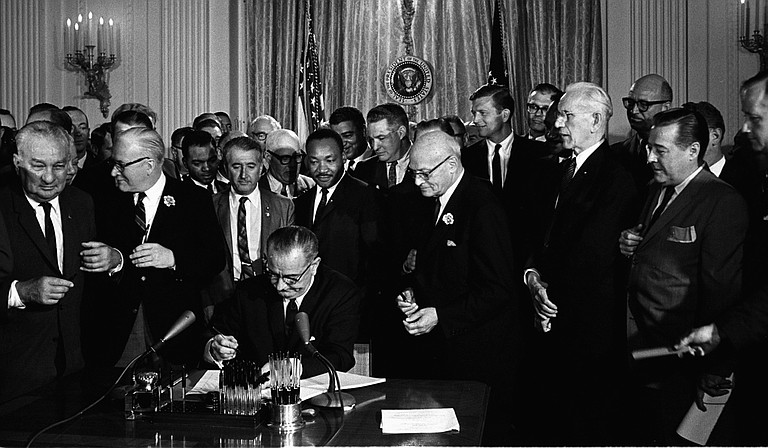President Lyndon B. Johnson signed the Civil Rights Act of 1964, which included Title IV provisions to de-segregate public schools that the U.S. Supreme Court had ordered in 1954. However, it would take another high court decision in 1969 to force desegregation of all Mississippi schools.
Wednesday, August 8, 2018
When I started first grade at Anniston Avenue Elementary in Gulfport, Miss, there was one little girl in the class who was African American.
Her name was Mary.
The year was 1965, and it would be a few more years before other children of color were bused into our school for forced integration.
I don't remember any of the others, but I remember Mary. She was in my class all the way through high-school graduation. She appeared at subsequent high-school reunions, showing off pictures of her children and telling of her life journey since our parting. She became a school teacher.
Yes, there were other classmates of color along the way who became our friends, but Mary was different. Different because she was there on the first day of first grade.
At 6 years old, I knew my colors, and I knew Mary's skin was different from mine. I knew her hair and pigtails were different from mine. I knew her parents were older and lived on the edge of the neighborhood our school served.
But she was just Mary, our playmate. Mary, the girl we ate lunch with in the cafeteria. Mary, the one we gossiped with before class. Mary, who turned into a woman and shared our memories of growing up in Gulfport.
On a trip home for one of those high-school reunions, I sat around my parents' kitchen table recounting the journeys of my classmates. I mentioned Mary. And that is when my father spoke up and told an incredulous story.
Basically, he claimed Mary was planted in my first-grade class to ease the way for integration. Yes, I noticed her parents were much older—more like the age of my grandparents. They had been childless until Mary came along, and she was exceptionally gifted. But a plant? Was this a conspiracy theory espoused by my father, or did this really happen? I could hardly believe my ears, but a 6-year-old would never question the arrangement that brought in a new classmate and playmate.
My parents did.
I may never know if this really happened, but it made me look at the situation differently. I grew up in the transition between Brown v. Board of Education and the Civil Rights Act of 1964. But I grew up on the white side. Mary was on the other side, maybe assigned to straddle the fence as a first-grader. I didn't see her as different, but she was. She faced the barriers in place for people of color, dealt with the prejudice of those around her. Nonetheless, she stood bravely as the only little black girl in that first-grade classroom full of white faces. I wonder about her memories from those days.
If the intent was to change the attitudes of a generation, it worked. Unlike the flight to council schools that occurred in other parts of the state, integration on the coast came and went without much notice. White families there lacked the resources to afford private schooling, so we stayed put and learned to get along.
The moral of the story?
Real change only comes to those who are open to new people and new ideas. A 6-year-old is a delightful open book, which is why segregated schools, churches and neighborhoods are such "dangers" to society. They lock us into a mindset as adults that change can rarely touch.
I hope Mary was a plant. That would make her a heroine of the Civil Rights Movement—a heroic 6-year-old staring down generations of oppression, changing minds and opening doors with her big grin and gangly legs.
Nancy Lottridge Anderson is the president and chief financial officer of financial advising company New Perspectives, Inc., and co-host of MPB's Money Talks.
This column does not necessarily reflect the opinions of the Jackson Free Press.


Comments
Use the comment form below to begin a discussion about this content.
Sign in to comment
Or login with:
OpenID